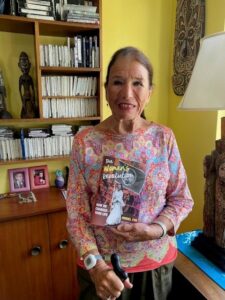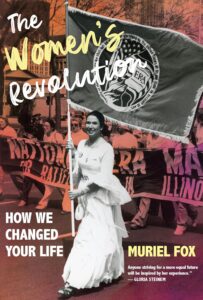
Not many people publish their first book at age 96, but Muriel Fox has spent a lifetime working against outdated expectations, and she’s not stopping now.
Her book, The Women’s Revolution: How We Changed Your Life, was released on June 18, and shortly beforehand the Westchester County Board of Legislators declared June 24 to be Muriel Fox Day, “thanking her for her crucial role in helping women gain equal rights so they could have the same opportunities as men.”
Fox, a resident of the Kendal on Hudson retirement community in Sleepy Hollow for the last 14 years, spent a year writing her book. “I have all the files – I have five file cabinets – and writers were always coming to me to go through my files, for their books. And I never really thought about writing my own book. But then, at the age of 94, I just became angry. First of all I was angry because we lost abortion and we still didn’t have the ERA. And then I was really angry at how many educated young people never heard of Betty Friedan and some never heard of NOW and some never even heard of Gloria Steinem. And I thought, “We did this, we changed the world and why don’t people know about it?”’

Not for the first time, Fox channeled her anger, rolled up her sleeves and got to work. The book is the result, reminding readers of who was involved in second wave feminism, what was achieved, and why.
Getting on with it has, in essence, been the story of Fox’s life, the bright young graduate from Barnard who was told at a 1950 job interview at public-relations powerhouse Carl Byoir & Associates, “This is very impressive but we don’t hire women writers.” She persisted, eventually got a job there and stayed for 34 years, ending up as executive vice president.
In 1963, Betty Friedan published the ground-breaking feminist book The Feminine Mystique, and Fox, now on the board of American Women in Radio and Television, invited her to come and speak. Friedan accepted, and in a conversation beforehand, Fox commiserated with her about women’s options and said: ‘We need an organization, don’t we? And Betty said, “You mean an NAACP for women?”’
Fox offered her services if the organization ever came into being, and in 1966 the call came, resulting in her heading publicity for the National Organization of Women and acting as Friedan’s deputy. And NOW set about its groundbreaking work. “We had to change people’s minds but we also had to change the laws and enforce the laws, and the reason that NOW was formed and was so active immediately was because Title 7 of the Civil Rights Act of 1964 was not being enforced. Title 7 outlawed discrimination on the basis of sex. … We had to fight, march, sue them.”
Fox relishes the progress made, after the effort, sacrifices and successes of her generation. But what had first inspired her feminism? “It was because of my mother. She was so unhappy; she just hated housework. And why should half of the universe have only one job? And it was certainly the wrong job for her. So I just knew, all my life, I did not want to be as unhappy as my mother.” And she wasn’t, instead making a happy marriage to a man who supported her feminism, having two children, and maintaining her career while giving as much time as possible to NOW.
instead making a happy marriage to a man who supported her feminism, having two children, and maintaining her career while giving as much time as possible to NOW.
Still passionate, political and determined to this day, Fox only admits one regret: “The only real regret I have in my life is that I didn’t have more time to spend with my children.”
River Journal readers receive 20% off The Women’s Revolution: How We Changed Your Life with code FEMINIST20. Scan the QR Code to purchase your copy.






